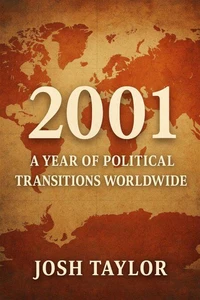This book provides a comprehensive analysis of the evolving relationship between the United States and the People's Republic of China since 1949, tracing the trajectory of their interactions through key historical, economic, technological, and geopolitical events. It explores the dynamic shifts from cooperation to confrontation, underscoring the complexities and intricacies of their strategic rivalry in a rapidly changing world.
Beginning with the early years following the founding of the PRC, the book examines how ideological differences, the Cold War, and the rise of China's economic power shaped U. S.-China relations. It delves into the transformative impact of China's economic reforms, particularly under Deng Xiaoping, and the ensuing challenges posed by China's growing global influence, culminating in the trade wars, technological competition, and military tensions of the 21st century.
The narrative further explores the ideological and political dimensions of the relationship, from China's state-driven model of capitalism to the U. S.'s commitment to liberal democracy, and the ongoing struggle for global leadership and governance. Through an in-depth examination of primary sources, historical events, and key figures in the relationship, the book provides critical insights into the shifting global order, emphasizing the role of technology, trade, security, and values in shaping the future of Sino-American interactions.
Ultimately, it contemplates the prospects of cooperation, confrontation, or coexistence in the face of a strategic rivalry that is set to define the 21st century and reshape the global landscape for generations to come.
This book provides a comprehensive analysis of the evolving relationship between the United States and the People's Republic of China since 1949, tracing the trajectory of their interactions through key historical, economic, technological, and geopolitical events. It explores the dynamic shifts from cooperation to confrontation, underscoring the complexities and intricacies of their strategic rivalry in a rapidly changing world.
Beginning with the early years following the founding of the PRC, the book examines how ideological differences, the Cold War, and the rise of China's economic power shaped U. S.-China relations. It delves into the transformative impact of China's economic reforms, particularly under Deng Xiaoping, and the ensuing challenges posed by China's growing global influence, culminating in the trade wars, technological competition, and military tensions of the 21st century.
The narrative further explores the ideological and political dimensions of the relationship, from China's state-driven model of capitalism to the U. S.'s commitment to liberal democracy, and the ongoing struggle for global leadership and governance. Through an in-depth examination of primary sources, historical events, and key figures in the relationship, the book provides critical insights into the shifting global order, emphasizing the role of technology, trade, security, and values in shaping the future of Sino-American interactions.
Ultimately, it contemplates the prospects of cooperation, confrontation, or coexistence in the face of a strategic rivalry that is set to define the 21st century and reshape the global landscape for generations to come.

 , qui est-ce ?
, qui est-ce ?